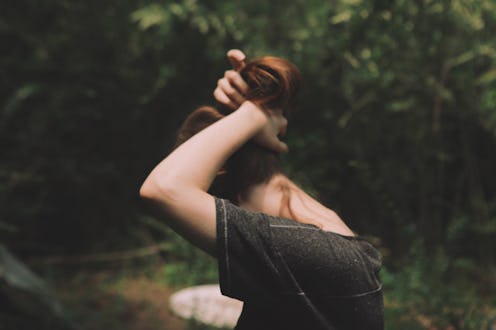Life
If You’re Having Trouble Sleeping, This Awesome Stress-Relief Technique Could Help
Acupressure, like its close cousin acupuncture, is a medicinal method that emerged from traditional Chinese medicine, and has been part of the alternative or complementary medical world for a long time. And studies may indicate that it has real medical value in specific situations — even if it's just a placebo effect or the product of a calming environment. Acupressure works by targeting certain pressure points on the body with steady force (acupuncture uses a needle, while acupressure merely uses fingers) and is thought in Chinese medicine to be a way of regulating bodily energy, aiding disease healing and helping health. Even if you don't buy into ideas about energy and flow, however, the idea of targeted massage, whether by yourself or others, at particular acupressure points across the body has been extensively researched, and it reveals some intriguing possibilities for helping sleep, stress, and nausea in particular.
"There are acupuncture points all around the body on the meridian lines that have different uses and effects," licensed acupuncturist Joel Granik tells Bustle. The points help balance the body’s energy flow (qi). Acupressure is when these points are stimulated through applying pressure." It's suggested that placing force on some acupressure points actually helps the body because it stimulates the same brain pathways as pain relief drugs. A study in 2015 from Georgetown noted that applying pressure to a particular acupressure point on rats reduced activity in one of the brain's stress pathways and may therefore reduce pain, but it's unknown whether this same mechanism occurs in humans. Whether this is true or not, when you delve into the science of acupressure's efficacy, you start to discover it's more than it might appear.
How Might Acupressure Help The Body?
One of the main ways in which acupressure's use has been explored has been in sleep. Does pressuring certain points on your body help you rest and have better quality sleep? The answer, it seems, might be a qualified yes. Breast cancer survivors in a 2016 study felt less fatigued and experienced higher quality sleep when they self-administered acupressure, and elderly people in nursing homes who had a course of expert acupressure for eight weeks for a 2017 study reported better sleep. An overview of 32 different studies about acupressure and sleep published in 2016 found that there seemed to be a uniform improvement in sleep, even among the elderly or disabled. But the scientists behind the review also pointed out a problem: "a high risk of bias", because the patients knew what was happening to them and might simply reinterpret their sleep patterns in the light of their nice, relaxing massage, even if it didn't actually make any difference.
Outside of sleep, acupressure has also been explored as an avenue for reducing nausea: it's been found effective in helping women who vomit from breast cancer chemotherapy, and Columbia University recommended it as a complementary therapy for those patients in 2017. (Scientists hoped it would reduce nausea in post-operative patients too, but the results there have been less promising.) A Taiwanese study in 2006 found it was effective in helping lower back pain, and a review of studies about acupressure and anxiety in 2015 found that it generally seems to help a bit. But again, it's not known why this might be, or whether it's all down to placebo effects. Still, there doesn't seem to be much harm in trying.
How Can You Do Acupressure Yourself?
"Acupressure is good for alleviating minor symptoms that affect sleep," Granik tells Bustle. But, he says, "it’s important to note that it does not solve or treat sleep issues completely." If you're experiencing serious sleep problems, he recommends acupuncture itself or a more serious treatment. "Acupressure," he says, "can help with minor symptoms, like calming nerves, reducing anxiety, decrease headaches, as a short-term, temporary fix."
If you want to try it at home, he has some tips. "There are a few easy-to-access points all over the body. You can apply pressure there with your fingers and if it feels good to massage the point, massage it. Your body will tell you how it’s responding to it," he says.
Particular pressure points may prove relaxing. "For sleep, in particular," Granik says, "the An Mian point below the ear can help put you to sleep quickly. Other points that are particularly helpful for sleep include the Stomach 36, or Zusanli, located about three to four inches below the knee and half an inch to the outside of your shin bone; the Pericardium 6, or Inner Pass, located three inches above the inner wrist; Heart 7, or Spirit Gate, located on the very outside of the wrist below the pinky; and Large Intestine 4, or Joining Valley, located between your thumb and index finger."
If you want to practice this at home, applying pressure for two to five minutes on each point with fingers is recommended, whether by you or by somebody else. "When pressing these acupressure points, listen to your body. You should feel immediate relief when you press down on these points. It should not hurt, and if you are pressing to a point where you feel pain, stop," says Granik. If you're collaborating with a person who's helping you, communicate with them about your pain levels and what you find bearable. He also says to remember an important point: "these acupressure points are for short-term, minor relief. It can help for a night or two." For more lasting issues, you'll need to seek intensive help.
